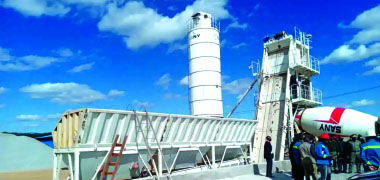Dinson sinks US$500m in new steel plant

Oliver Kazunga Senior Business Reporter
DINSON Iron and Steel Company (Disco) has so far invested about US$500 million into its US$1,5 billion steel plant in Manhize, Mvuma, and remains on course to meet its August 2023 production deadline.
Construction of the steel plant, which is touted as Africa’s biggest integrated steel works, began this year. In an interview, Disco project director Wilfred Motsi said construction of the plant was now 48 percent complete.
“Construction is ongoing with about US$500 million having been sunk into the project so far and we are confident that we are on track to meet our August 2023 first production deadline as the plant is now at 48 percent complete; all civil works of the steel plant have been done.
“As you might be aware, we are investing a total of US$1,5 billion in the steel project and the first phase will be processing 600 000 tonnes of carbon steel for both local and export markets,” he said. The project will create 6 000 jobs directly and 30 000 others downstream while also adding impetus to the National Development Strategy 1 (NDS1) by fostering industrialisation and overall economic growth. It is expected the project will stimulate production across the engineering, iron and steel industries as well as generate more foreign currency for the country. In line with NDS 1 objectives and Vision 2030 targets which Zimbabwe is expected to have reached upper middle-income economy status, the steel plant is expected to see the development of a new town in the area.
Infrastructural projects, such as a dam to be constructed in the area to supply water to the steel works as well as roads are taking shape in and around the project area, while an irrigation project in the same locality will enhance national food and nutrition security.
“During the course of this year, we have also met all the statutory obligations including EIAs (Environmental Impact Assessments) and following the granting of national project status by the Government early this year, we have moved with speed and started building a beneficiation plant in Manhize.
“We have also constructed a bridge over Munyati River which is now 90 percent complete.
“We have also signed a Memorandum of Understanding with (Zinwa) Zimbabwe National Water Authority for the construction of a dam to provide water to the steel plant, a new town being built as well as an irrigation project to be developed there for the community,” said Mr Motsi. Following the closure of Zimbabwe’s largest steel plant, Zisco in 2008, the country is spending US$400 million annually importing iron and steel products.
The Manhize steel plant is expected to reduce steel imports by 90 percent.
Disco, which is one of Tsingshan’s three subsidiaries in Zimbabwe, intends to build a 1 000-kilometer railway network to be used for ferrying bulk iron and steel products to the markets or ports before being exported.
The group’s two other local subsidiaries are Dinson Colliery and Afrochine Smelting (Pvt) Limited.
“We are also going to refurbish and construct a 1 000-km railway line system in Zimbabwe to provide a dedicated, reliable, uninterrupted, and efficient railway system to be able to ferry our products for both local and export-imports routes,” said Mr Motsi. In July, Disco announced that it had started scouting for local and export markets for its products ahead of production next year. This also dovetails with the objectives of ZimTrade to grow Zimbabwe’s exports to US$7 billion next year and US$14 billion by 2030.
Last year, Zimbabwe’s exports totaled US$6,03 billion, representing 37,3 percent increase, from US$4,39 billion recorded in 2020.
Meanwhile, Tsingshan Holding Group Limited which has invested a cumulative US$2 billion in Zimbabwe, also plans to set up a lithium concentrate plant with a production capacity of two million tonnes per annum as well as a cement factory with an annual production of one million tonnes.
Through Afrochine, which started operations in 2012, Tsingshan is producing 150 000 tonnes per annum of ferrochrome for export. In Hwange, Dinson Colliery is engaged in coking coal, coal washing, coal tar recovery, coal tar processing, and other activities.
The colliery exports high-quality coke to South Africa and Zambia.







Comments